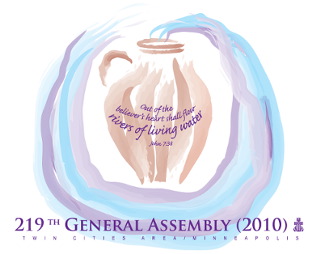Among the many items on the agenda of the the 219th General Assembly of the Presbyterian Church (U.S.A.), taking place July 3-10 in Minneapolis, is consideration of the controversial report of the organization’s Middle East Study Committee.

A number of Jewish groups are sounding the alarm about the report, which is titled “Breaking Down the Walls.”
In an op-ed published Saturday, the opening day of the Presbyterian gathering, in the Star Tribune, Rabbi Abraham Cooper, associate dean of the Simon Wiesenthal Center, and Rabbi Yitzchok Adlerstein, director of interfaith affairs for the center, called the report “devastating.”
Alleging that the Presbyterian report resulted from a stacked deck — “seven of nine appointees [to the study committee] turned out to be openly pro-Palestinian, and the one pro-Israel member soon resigned” — Cooper and Adlerstein wrote: “The report is a full-scale attack on the Jewish state. It rejects Jewish claims of connection to the land through millennia of continued presence. It disregards a century and a half of Zionist pioneers building up the Holy Land, lamenting modern Israel as a mistaken creation of Western guilt over the Holocaust. It insists that the Israeli presence on the West Bank and Gaza is the single cause of all that is wrong in the Middle East.”
In a similar vein, David J. Michaels, director of United Nations and Intercommunal Affairs for B’nai B’rith International, writes that the Presbyterian report “embraces, without stated caveats, Kairos, a Palestinian document demonizing Israel.”
In an open letter to Presbyterian Church delegates published on the Faith blog of The Washington Post, Michaels writes: “The report itself reflects a strikingly incomplete and unbalanced, and thus unhelpful, narrative of the history and reality in the Middle East. It minimizes the roots of the Jewish people in Israel, as well as Israelis’ painful sacrifices for peace, while magnifying Palestinians’ suffering, but not their responsibilities and perpetuation of violence. What emerges is a caricature whereby Israel does no right, but its adversaries are seen as doing little wrong.”
So what does “Breaking Down the Walls,” a 179-page report, recommend to the Presbyterian faithful convening this week in Minneapolis?
Here is an overview of the Presbyterian position:
To summarize at the outset our principal concerns, the Presbyterian Church (U.S.A.) seeks to strengthen its past positions on behalf of peace between Israelis and Palestinians and the cessation of violence by all parties, and its opposition to Israel’s ongoing expansion of Jewish settlements in the West Bank and East Jerusalem and its continuing occupation of those territories. We also call upon the various Palestinian political factions to negotiate a unified government prepared to recognize Israel’s existence. We proclaim our alarm and dismay: both over the increasingly rapid exodus of Christians from Israel/Palestine caused by anti-Palestinian discrimination and oppression, the growth of Islamic and Jewish fundamentalism, and the occupation-related absence of economic opportunity; and also over the exodus of Christians from other parts of the region caused by various military, economic, religious, and cultural factors. And we oppose the government of Iran’s nuclear ambitions, its sponsorship of international guerilla warfare, and the threat these pose both to Israel and to Arab states.
In addition to “an immediate freeze” on the “establishment or expansion of Israeli West Bank settlements,” or building in East Jerusalem, the Middle East Study Committee report specifically recommends the “relocation by Israel of the Separation Barrier to the 1967 border.”
Also, the report urges the “withholding of U.S. government aid to the state of Israel as long as Israel persists in creating new West Bank settlements.”
In the area of divestment, the report calls for “continuing corporate engagement through the Committee on Mission Responsibility Through Investment with companies profiting from the sale and use of their products for non-peaceful purposes and/or the violation of human rights.” On this point, the Presbyterian report “strongly denounces Caterpillar’s continued profit-making from non-peaceful uses of its products and presses Caterpillar to review carefully its involvement in obstacles to a just and lasting peace in Israel-Palestine and to take affirmative steps to end its complicity in the violation of human rights.”
The BDS (boycott, divest and sanction) movement targeting Israel has singled out Caterpillar, because its bulldozers have been used to destroy Palestinian homes.
In the area of sanctions, the report calls on the U.S. government “to exercise strategically its international influence, including the possible withholding of military aid as a means of bringing Israel to compliance with international law and peacemaking efforts.”
Anticipating criticism from supporters of Israel, “Breaking Down the Walls” states:
We are aware that our report will likely draw such critiques as being “unfair” or “imbalanced.” We believe that our report, however, is quite fair. Our analysis, both through careful research and through our experience of being in the Middle East, is that Israel is the most powerful party to the conflict. Therefore, Israel has both the responsibility and the ability to reverse the course of the current precipitous decline throughout the region.
J Street, the dovish Washington-based lobbying group, also has criticized the Middle East Study Committee report. Rachel Lerner, associate executive director of the J Street Education Fund, said that J Street was never consulted about the report. She expressed J Street’s “serious disagreements with the Committee’s recommendations, particularly the call for the possible withholding of U.S. aid to Israel.”
Further, J Street took issue with calls to suspend U.S. military aid to Israel, which would diminish the Jewish state’s military edge, “an important anchor for a peace process based on providing Israel with the confidence and assurance to move forward on a solution based on land for peace.”
Lerner concluded that “the study document consistently downplays Israel’s very real security concerns, appears to shrug off any Palestinian responsibility for resolving the ongoing conflict, and underplays the Israeli narrative throughout. J Street firmly believes that both Israelis and Palestinians will have to do their part in taking the necessary steps toward achieving a two state solution.”
The Middle East Study Committee report will be brought before the 700 commissioners of the General Assembly during the week. There likely will be a spirited discussion of the report’s recommendations prior to a vote.
— Mordecai Specktor




















Comments 0